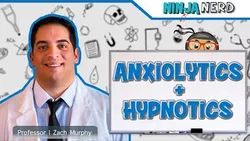
Anxiolytic & Hypnotic Drugs 
This course provides an overview of anxiolytic and hypnotic drugs, including their pathophysiology, mechanisms of action, and treatment approaches. It covers the physiology of anxiety and insomnia, as well as the use of anxiolytics and hypnotics to treat these conditions. The course also discusses the advantages and disadvantages of these drugs. ▼
ADVERTISEMENT
Course Feature
![]() Cost:
Cost:
Free
![]() Provider:
Provider:
Youtube
![]() Certificate:
Certificate:
Paid Certification
![]() Language:
Language:
English
![]() Start Date:
Start Date:
On-Demand
Course Overview
❗The content presented here is sourced directly from Youtube platform. For comprehensive course details, including enrollment information, simply click on the 'Go to class' link on our website.
Updated in [February 21st, 2023]
Learners can learn about the introduction and pathophysiology of anxiety and insomnia, the mechanism of action for anxiolytics and hypnotics, the treatment approach to anxiolysis and hypnosis, and the adverse effects of anxiolytics and hypnotic drugs. They can also practice questions related to the topics and gain a better understanding of the material. Additionally, learners can gain insight into the development direction of anxiolytic and hypnotic drugs and how to apply the knowledge in real-world scenarios.
[Applications]
After completing this course, students should be able to apply the knowledge they have gained to their practice. They should be able to identify the pathophysiology of anxiety and insomnia, understand the mechanism of action for anxiolytics and hypnotics, and develop a treatment approach to anxiolysis and hypnosis. Additionally, they should be able to recognize the adverse effects of anxiolytics and hypnotic drugs. Finally, they should be able to answer practice questions related to anxiolytic and hypnotic drugs.
[Career Paths]
1. Clinical Psychologist: Clinical psychologists assess, diagnose, and treat mental, emotional, and behavioral disorders. They use a variety of therapeutic techniques, such as cognitive-behavioral therapy, to help patients manage their symptoms and improve their overall well-being. The demand for clinical psychologists is expected to grow as more people seek help for mental health issues.
2. Psychiatric Nurse: Psychiatric nurses provide care for patients with mental health issues, such as anxiety and depression. They work closely with psychiatrists and other healthcare professionals to develop treatment plans and provide support to patients. The demand for psychiatric nurses is expected to increase as more people seek help for mental health issues.
3. Mental Health Counselor: Mental health counselors provide counseling and therapy to individuals, couples, and families. They help clients identify and address issues that are causing distress and help them develop coping strategies. The demand for mental health counselors is expected to grow as more people seek help for mental health issues.
4. Psychopharmacologist: Psychopharmacologists specialize in the study of the effects of drugs on the brain and behavior. They use their knowledge of pharmacology and neuroscience to develop new medications and treatments for mental health issues, such as anxiety and depression. The demand for psychopharmacologists is expected to increase as more people seek help for mental health issues.
[Education Paths]
1. Bachelor of Science in Nursing: This degree path focuses on the clinical aspects of nursing, including the administration of anxiolytic and hypnotic drugs. Students will learn about the pathophysiology of anxiety and insomnia, the mechanism of action for anxiolytics and hypnotics, and the treatment approach to anxiolysis and hypnosis. This degree path is becoming increasingly popular as the demand for nurses with specialized knowledge in this area grows.
2. Master of Science in Clinical Psychology: This degree path focuses on the psychological aspects of anxiety and insomnia, including the diagnosis and treatment of these conditions. Students will learn about the pathophysiology of anxiety and insomnia, the mechanism of action for anxiolytics and hypnotics, and the treatment approach to anxiolysis and hypnosis. This degree path is becoming increasingly popular as the demand for mental health professionals with specialized knowledge in this area grows.
3. Doctor of Pharmacy: This degree path focuses on the pharmacological aspects of anxiolytic and hypnotic drugs, including the administration, dosage, and side effects of these drugs. Students will learn about the pathophysiology of anxiety and insomnia, the mechanism of action for anxiolytics and hypnotics, and the treatment approach to anxiolysis and hypnosis. This degree path is becoming increasingly popular as the demand for pharmacists with specialized knowledge in this area grows.
4. Doctor of Philosophy in Neuroscience: This degree path focuses on the neurological aspects of anxiety and insomnia, including the underlying causes and treatments of these conditions. Students will learn about the pathophysiology of anxiety and insomnia, the mechanism of action for anxiolytics and hypnotics, and the treatment approach to anxiolysis and hypnosis. This degree path is becoming increasingly popular as the demand for researchers with specialized knowledge in this area grows.
Course Provider

Provider Youtube's Stats at AZClass
Discussion and Reviews
0.0 (Based on 0 reviews)
Explore Similar Online Courses

CompTIA A+ Certification Full Video Course for Beginners

How to Repair and Remove Dents from your Car (DIY)

Python for Informatics: Exploring Information

Social Network Analysis

Introduction to Systematic Review and Meta-Analysis

The Analytics Edge

DCO042 - Python For Informatics

Causal Diagrams: Draw Your Assumptions Before Your Conclusions

Whole genome sequencing of bacterial genomes - tools and applications

Birth of a drug

Pharmacology


Start your review of Anxiolytic & Hypnotic Drugs